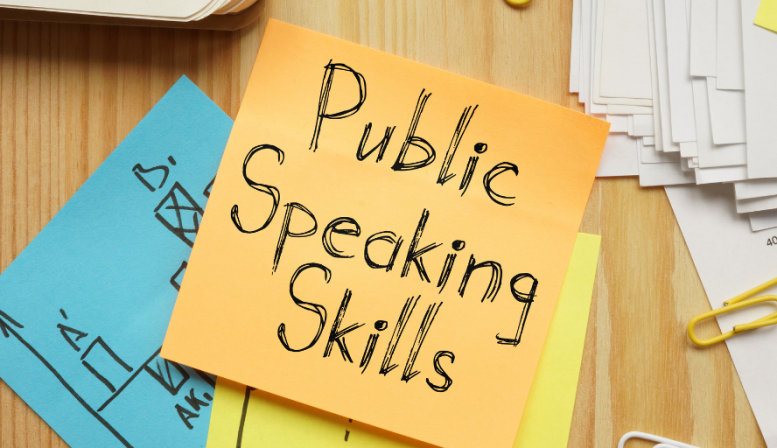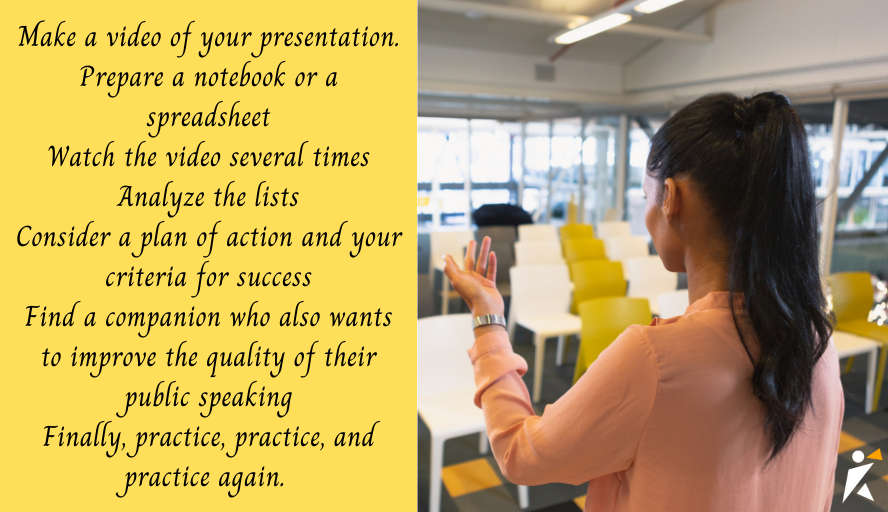7 Simple Methods for Improving Your Public Speaking Skills

No person is innately good at public speaking. Public speaking must be learned. In this article, we will help you to make better speeches time after time.
A presentation at school, a speech at a student conference, a diploma defense, a story about yourself when applying for a job – everyone needs public speaking skills, and no doubt you are well aware of the importance of a logical presentation, visual comfort, and proper presentation.
Dozens of books, courses, and training are devoted to each of these three essentials of public speaking, but how do you put the many useful tips into practice?

We suggest that you work consistently on each aspect of public speaking, using an accessible tool such as video recording.
Make a video of your presentation. It's great if you have a video of a recent performance. Even if it's just a short segment, if it clearly shows you and at least part of your audience, such a recording is very useful for getting started. If you don't have a recording, it's a good time to make one during rehearsals for your next performance. The closer to actual speech conditions that the video is made, the more effective subsequent analysis will be. If you are not planning to make a speech in the near future, but already want to "pump" this skill, start by recording short monologues of 1-2 minutes on a topic interesting to you: you will get used to the camera, feel the timing, and be able to train different intonations.
Prepare a notebook or a spreadsheet on your computer, where you will record the results of the parsing of the speech. You can start with just two columns: "good" and "fix".
Watch the video several times, concentrating each time on just one part of your performance. Watching the video carefully by yourself is quite a challenge. Be patient, think about how much better your next performance will be, and start analyzing!
The first time you watch it, pay attention only to the logic and accessibility of your presentation. Did you inform the audience of the purpose of your presentation? Did you explain your main point clearly? Was your story logically told? Did you keep to the time limit, or was the end of your presentation hurried or stretched out?
In your second review, analyze your tone. How do you speak? Is it loud and clear enough? Is the style of your speech consistent with the topic of the presentation? Did you manage to avoid parasitic words? How are you holding yourself? Are you walking or standing, looking into the audience or at your slides, smiling or tense with fear?
If you have the energy for a third viewing, you can devote it to the analysis of your interaction with the audience. Have you succeeded in capturing their attention? Are you asking them questions? Does the audience respond to your jokes? Of course, relaxed interaction with the audience is the ultimate in public speaking, and we're sure you'll be able to master this aspect of speaking, too!
Analyze the lists. It's great if you have a few notes in your "good" column! Remember to use these skills in your next speeches, and build on them as a foundation. The "fix" list can be quite long, but don't be intimidated. Choose 2-3 items from it. It's best to start working on improving the structure and presentation aspects of your speeches. Any lack of usefulness and meaning in the report will not be replaced by successful jokes and dialog with the audience. So if you can't create an informative and interesting speech yourself, you could ask an essay writer online to do it for you.
Consider a plan of action and your criteria for success. Once you've determined what you will work on, think about how you will do it and, most importantly, what outcome you think is good enough. Add to your chart the columns "What I will do" and "How I will know if the goal is met?" For example, you notice that you're looking at your slides for most of the presentation, not at the audience. So, in rehearsals and upcoming speeches, you need to pay special attention to how you stand and where you look. Your plan of action might look like this: "learn well the order of the slides and what I will say; ask someone at a rehearsal to interrupt me as soon as I turn away; at the performance do not forget to pick out people in the audience to address. You can be considered a success if, at the next video recording, you find that you are already facing the audience most of the time. If you decide to work on the simplicity and clarity of your explanations, be bold enough to get rid of unnecessary details on your slides and in the speech. Look for simple examples that explain your thoughts, and ask your colleagues to listen to you. Do not set yourself the ambitious goal of earning a reputation as a person who can clearly explain complex things. Start with a more simple aim like: "One of the listeners said at the end of the presentation, 'Thank you, I finally understand everything!".
Find a companion who also wants to improve the quality of their public speaking or wants to help you improve. Friendly support, feedback, help with technical questions, joint reflection, and finding solutions will allow you to go much further than if you go it alone.
Finally, practice, practice, and practice again. Take every opportunity to speak, because you only get skilled at anything through repetition. Video-record and analyze your performances regularly. Take notes of what you have achieved, and use these lessons learned in your next presentations. Work on your shortcomings by setting specific, achievable goals for your next performance. You'll find that it won't be long before you make significant progress!




